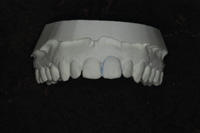When patients call a dentist’s office to make an appointment or to get information, most often they’re put on hold. That can be frustrating. Savvy dentists are scrutinizing the “patient experience,” but they often overlook the first opportunity they have to create a good impression—the time telephone callers spend on hold before speaking with a staff member. On-hold time is a fact of life for every practice, and it is simply not possible to staff efficiently and eliminate it completely. If the average on-hold time is 30 seconds, a practice that receives 100 calls a day/260 business days a year has callers on hold 200 hours a year! Many callers left in “dead air” simply hang up and they may not call back.
Some practices play the radio on hold. However, under copyright law, this requires the payment of hefty annual fees to ASCAP, BMI, and SESAC, the organizations that collect music royalties. Even worse, your callers could hear a radio commercial for a competing dentist! Playing music tapes or CDs requires the same royalties as radio. “Elevator” music is expensive and provides no marketing benefit. The best solution is a mix of music and messages about your practice. It’s inexpensive and makes otherwise dead on-hold time productive.
ON-HOLD SYSTEMS
The earliest on-hold systems consisted of an endless cassette tape playing on an inexpensive tape player. They required constant maintenance and suffered from frequent quality and breakdown problems. The advent of CDs offered a better solution; they never wear out, they sound great, and they provide space for more than an hour of messages.
CDs themselves are great, but using off-the-shelf, consumer-grade CD players to play on-hold messages doesn’t work. They’re not designed to be played continuously and will burn out quickly. Most only allow the repetition of a single track or the whole CD. Repeating a single message is monotonous and repeating the whole CD means it can’t contain time-sensitive messages like holiday greetings. Also, the output volume of most CD players is inadequate for on-hold use, so an additional amplifier is required. Finally, if there’s even a momentary power interruption, a regular CD player loses its programming and stops.
CD players that have been developed specifically for on-hold applications solve these problems. Costing under $500, these players are designed for continual duty, have built-in amplifiers, and they preserve their programming if power is lost. They also easily hook up to business phone systems. CDs come packed with more than an hour of 15- to 60-second messages that can cover a huge variety of topics of interest to dental patients. On certain models, messages may be mixed and matched at will. A CD can contain messages for each holiday, special promotions, and other time-sensitive material, which can be programmed into the playlist only when they’re needed.
A lower-cost option for practices not needing the large message capacity and programmability of CDs is players using digital memory chips (about $250). The newest ones utilize removable memory cards like those used in digital cameras. There are no moving parts to wear out or break, so the systems provide years of trouble- and maintenance-free performance.
Another option is the “telephone download” digital player (about $300). These allow the message provider to download message updates remotely by telephone, so no staff involvement is required. Installation requires a telecom technician, but it shouldn’t take more than 10 to 15 minutes. Because downloads take only a few minutes and can be programmed to take place after hours, the player can share an existing fax or phone line. Since they’re a bit more expensive, this option is generally selected only by practices that need to update their messages very frequently (more than 4 times per year).
CHOOSING A VENDOR
Choose your message-production vendor carefully. Many vendors can provide both player and production services, which allows a single point of contact. If there’s a problem, there’s no squabbling between an equipment vendor and a service provider regarding responsibility. Many smaller vendors do not have staff copywriters, so you must provide a ready-to-produce script. Ask about turnaround times. Many smaller vendors rely on subcontract studio engineers and narrators, and production can take awhile, especially if you need post-production changes. Check references. Start-up on-hold vendors are everywhere and some are nothing more than radio DJs moonlighting from home. Some use music that’s not properly licensed, subjecting you to potential legal liability. They tend to disappear as quickly as they appear, leaving you holding the proverbial bag. A vendor that’s been in business at least 5 years is a safe bet.
Avoid any vendor that insists on a contract for ongoing monthly or annual fees. Vendors that insist on a service contract are hoping you’ll forget to use the service, resulting in a “money-for-nothing” windfall for them. If a vendor does a good job initially, you’ll likely return for updates when you need them. Providers that try to lock you into a service contract obviously aren’t confident that their quality of service will make you want to return.
Don’t even consider leasing. Back when on-hold players cost over $1,000, leasing was a way to make them affordable for smaller businesses. The price of on-hold players is now so low that you can easily afford to buy one outright. Leasing an on- hold package poses great risk. Here’s why: the message on-hold vendor technically sells to the leasing company a package that includes a player and a number of message updates. The leasing company pays the message on-hold vendor for the whole package in advance (including the future updates), then turns around and leases the package to you, typically for 3 years. The leasing company contract specifically states that it has no responsibility for services the message on-hold vendor is supposed to provide. If the message on-hold vendor can’t (or won’t) perform, you’re still liable for the lease payments. Message on-hold vendors go out of business all the time. There is simply no reason to expose yourself to this risk. Quality vendors will gladly sell you a player with an initial message production, then sell you updates when you need them. Pay-as-you-go means no risk.
CONCLUSION
On-hold message topics are limited only by your imagination. Promote wellness tips, detail proper brushing and flossing techniques, and introduce staff members. Low-key information is the key. Frequently, thank the caller for holding. Don’t be afraid to be creative and entertaining. Callers will enjoy the messages and you’ll turn them into satisfied patients.
Ms. Desnoes is a member of the public relations department for Applied Media Technologies Corporation (AMTC), a privately owned company founded in 1991, that is based in Clearwater, Fla. It is a market leader in telephone on-hold messaging systems, having pioneered the use of CD and removable memory card technology in on-hold player equipment. It serves over 12,000 clients worldwide, including Adecco, Bally Total Fitness, Continental Airlines, and Morgan Stanley. She can be reached by visiting the AMTC Web site at amtc.com.











